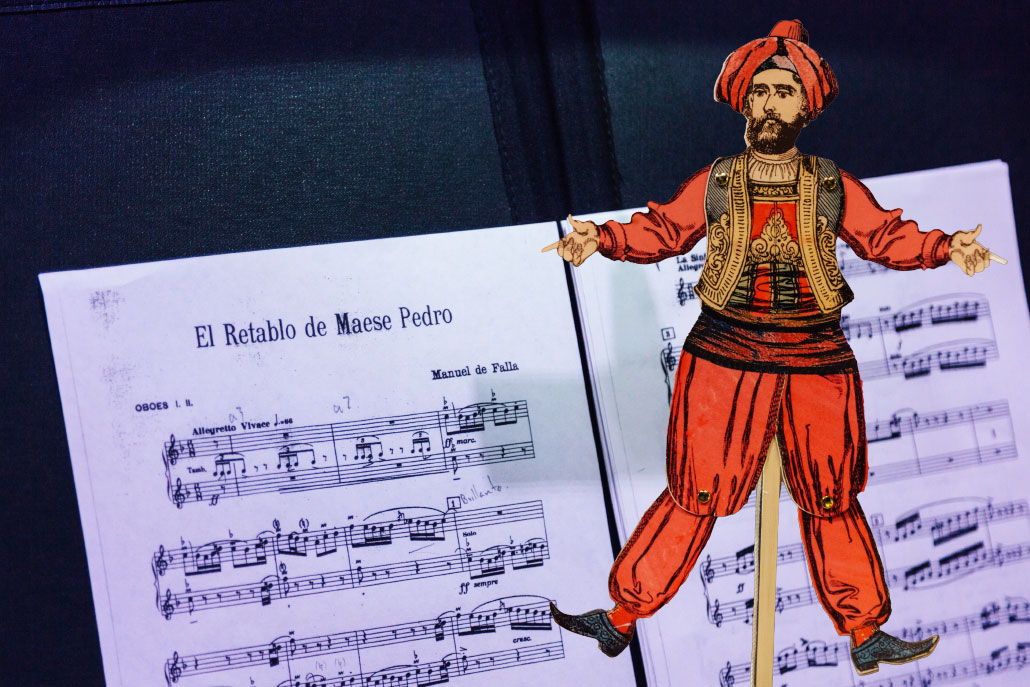The Altarpiece of Maese Pedro, by Manuel de Falla
Come, come see your graces…!
Everyone sit down…
Don Quixote, who was traveling the roads on Rocinante's back, finds a puppet theater offered by the puppeteer Master Pedro and his assistant Trujamán...
Discover the outcome of the story in this feature!
“We are going to encounter the work in three planes. First the story told by the singers, which is that of Don Quixote who finds a traveling theater, then the scene in the theater, with a mix of animation and two-dimensional puppets that tells the story of Melisendra who is held captive for love. , and finally, the orchestral plane, which narrates and paints with music the actions that happen both in the theater and in the singers,” explains Alejandro Roca, director.

The Altarpiece of Maese Pedro, by Manuel de Falla, is the first opera production of the Medellín Philharmonic Orchestra and is presented for the first time in Colombia. It arrives on stage under the musical direction of maestro Alejandro Roca and the stage direction of Pedro Salazar, and the participation of tenor Christian Correa (Maese Pedro), mezzo-soprano Laura Mosquera (Trujamán), baritone Nelson Sierra (Don Quixote) and set designer Pablo Castillo.
The Maese Pedro Altarpiece is presented by the Filarmed-Comfama Alliance, with the support of the Spanish Embassy in Colombia, from the Teatro Universidad de Medellín.

The work
The Altarpiece of Maese Pedro is an opera in Spanish for cardboard puppets and three singers by Manuel de Falla, with a libretto inspired by an episode from Don Quixote. The work was composed to be performed at the concerts and private performances offered in Paris by the Princess of Polignac to whom it is dedicated, sharing a dedication with Miguel de Cervantes by the author, Manuel de Falla.
This work includes chapters XXV and XXVI of the second part of Don Quixote de la Mancha, in which the puppeteer Master Pedro appears and where the story of Melisendra, wife of Don Gaiferos, who was held captive by King Marsilio, is told. When her husband rescues her, they are chased by the Moors. And Don Quixote, who confuses reality with imagination, ends up intervening to help the fugitive puppets.

Opera, music and puppets
Manuel de Falla considered puppet theater an ideal medium to propagate his innovative ideas, both for its popular character and for its comic aspects and, above all, for its artificial actors who offered the possibilities of expressing themselves beyond human representation. “For many centuries, human beings have experienced the need to express themselves and represent the world through figures made with cardboard, wool or wood, that is, transcend reality in an imaginative and playful way. The use of marionettes and puppets constitutes an art as old as civilization, since they have been used to reflect the deepest and most superfluous aspects of individuals and society. Folklore Magazine. The influence of “Don Quixote” on the work of Manuel de Falla.
The set designer Pablo Castillo says that he set the scene and the characters' costumes in 20th century Medellín. “I represented the theater in the absent Teatro Bolívar, demolished in 1954. The Bolívar was the main theater in Medellín and was the scene of famous companies of theater, ballet and concert artists. More than a trip to the past, it is a reflection on our present and future,” explains Pablo.

Who really was Master Pedro?
He is a rogue, a fugitive, one of the most mysterious characters in Don Quixote. One more reason to approach this musical version of one of the most entertaining stories that Cervantes wrote in Don Quixote.
“Don Quixote lives in us, in our culture and Hispanicity. We can even see the spirit of these characters walking through our streets. It is also an opera in Spanish by Manuel de Falla, which proposes a unique musical universe close to us. Despite being so short, it is a musical and scenic challenge. A small but precious gem.” Pedro Salazar, stage director

When?
Sunday June 13
Hour
11:00 am
Channel
La Tiquetera View
Ticket office:
Comfama Affiliates
Rate A: $8,000
Rate B: $11,000
Rate C: $28,000
Unaffiliated: $30,000





